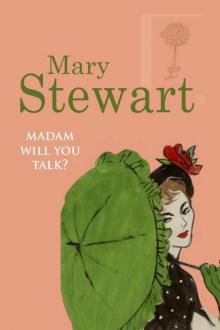- Home
- Mary Stewart
Nine Coaches Waiting Page 3
Nine Coaches Waiting Read online
Page 3
Madame de Valmy turned to me then. ‘Here we are,’ she said unnecessarily, but with such grace that the cliché took on almost the quality of a welcome. She gave me her sweet, fleeting smile, and turned towards the house.
As I followed her I got only the most confused impression of the size and graciousness of the place – the great square façade with the sweep of steps up to the door, the archway on our left leading to courtyard and outbuildings, the sunny slope beyond these where orderly kitchen gardens climbed towards another tree-bounded horizon. … I saw these things only vaguely, without noticing. What met me with the rush almost of a wind was the sunlight and space and the music of the trees. Everywhere was the golden light of late afternoon. The air was cool and sweet and very pure, heady with the smell of pines and with the faint tang of the snows.
A far cry, certainly, from Camden Town.
I followed my employer up the wide flight of steps and past a bowing manservant into the hall of the château.
3
His form had not yet lost
All her original brightness, nor appeared
Less than Archangel ruin’d.
Milton: Paradise Lost.
My first thought was, he lied in every word,
That hoary cripple, with malicious eye
Askance to watch the working of his lie
On mine …
Browning: Childe Roland.
At first I did not see the woman who waited for us a few paces inside the great door.
The hall seemed immense, but this was mainly because it was very high and full of shadows. The floor was a chilly chessboard of black and white marble, from which, opposite the door, a staircase rose to a wide landing lit by a window whose five tall lancets poured the sun downwards in dazzling shafts. At the landing the staircase divided, lifting in twin graceful curves towards a gallery. So much I saw, but the light, falling steeply through the speartips of the high windows, threw all but the centre of the hall into deep shadow.
I was still blinking against the glare when I heard a voice greeting Madame de Valmy, and then a woman came towards us in welcome. I supposed she was the housekeeper. She was a stout body of sixty-odd, with a fat comfortable face and grey hair worn neatly in an old-fashioned bun. She was dressed in severe black, her only ornament – if it could be called that – being a pair of gold-rimmed pince-nez which stuck out of a pocket high on her bosom, and were secured by a chain to a plain gold pin. Her pleasant face, her plodding walk, her whole appearance were solid respectability personified. This was no secret dark Savoyard, at any rate.
She looked at me curiously as she greeted Madame de Valmy. She had a cheerful voice that sounded perpetually a little out of breath, and surprisingly, her French, though fluent, was atrociously bad.
Madame answered her greeting absently. In that merciless cascade of light the lines in her face showed up clearly. She said abruptly, her eyes sliding past the woman in black towards the dimmer background of the hall: ‘The Master: he’s well?’
‘Oh yes, madame. He’s been – oh, quite his old self the last few days, madame, if you’ll forgive my saying so … interested in what’s going on, the way he hasn’t been for long enough, and full of plans. Oh, quite like old times, madame.’
She spoke with the ease of an old servant, and her face showed her very real pleasure in the good news she could give her employer. More pleasure, indeed, than Madame de Valmy’s own face reflected. I thought I saw a shadow pass over it as she said: ‘Plans?’
‘Yes, madame. I don’t rightly know what they are, myself, but he and Armand Lestocq were talking it over for long enough, and I do know there’s extra hands busy in the garden, and a man came today to look round the place and give his estimate for the jobs the Master was talking about last winter. He’s here now, as it happens, madame. He went up to take a look at the stonework on the west balcony, and I think the Master went with him. The Master’s lift wasn’t at the ground floor when Seddon made up the library fire.’
Madame de Valmy was pulling off her gloves with quick nervous movements. She said abruptly: ‘Do you know if he has heard from Monsieur Hippolyte?’
‘I think so, madame. There was a letter a week ago, on Tuesday … no, it was Wednesday; it was your letter came from London on Tuesday about the young lady.’ She paused, puffing a little, and then nodded. ‘That’s right. The one from Athens came on the Wednesday, because I remember Armand Lestocq was up here that very day, and—’
‘Very well, Mrs. Seddon, thank you.’ Madame de Valmy might hardly have been listening. ‘You said the Master was upstairs? Please send someone to tell him I’m here with Miss Martin.’
‘I’ve already done that, madame. He most particularly asked to be told the minute you arrived.’
‘Ah, thank you.’ Madame de Valmy turned then towards me, still with those abrupt, slightly nervous movements, and spoke in English. ‘Now, Mrs. Seddon, this is Miss Martin. I wrote to you about her when I informed the Master. Miss Martin, Mrs. Seddon is the housekeeper here. She is English, so you need not feel too much alone. Her husband is our butler, and he and Mrs. Seddon will do what they can to help you.’
‘That we will,’ said Mrs. Seddon warmly. She beamed at me and nodded, so that the gold chain on her bosom bobbed and glittered. ‘You’re very welcome, I’m sure.’
‘Miss Martin’s rooms are ready?’
‘Oh, yes, madame, of course. I’ll take her up now, shall I, and then show her round myself, seeing that perhaps she’s a little strange?’
‘Thank you, yes, if you will, but not straight away. She will come upstairs presently. Perhaps you will wait for her?’
‘Of course, madame.’ Mrs. Seddon nodded and beamed again, then retreated, puffing her way steadily up the stairs like a squat determined tug.
Madame de Valmy turned as if to speak to me, but I saw her eyes go past my shoulder, and her hands, which had been jerking her gloves between them, stilled themselves.
‘Léon.’
I heard nothing. I turned quickly. Even then it was a second or so before I saw the shadow detach itself from the other shadows and slide forward.
Though I had known what to expect, instinctively my eye went too high, and then fell – again by instinct, shrinkingly – to the squat shape that shot forward, uncannily without sound, to a smooth halt six feet away.
Pity, repulsion, curiosity, the determination to show none of these … whatever feelings struggled in me as I turned were swept aside like leaves before a blast of wind. The slightly dramatic quality of his entrance may have contributed to the effect; one moment a shadow, and the next moment silently there … But, once there, Léon de Valmy was an object for no one’s pity; one saw simply a big, handsome, powerful man who from his wheelchair managed without speaking a word to obliterate everybody else in the hall – this literally, for almost before the wheelchair stopped, the servants had melted unobtrusively away. Only Mrs. Seddon was still audible, steaming steadily up the right-hand branch of the staircase towards the gallery.
It was a tribute to Léon de Valmy’s rather overwhelming personality that my own first impression had nothing to do with his crippled state; it was merely that this was the handsomest man I had ever seen. My experience, admittedly, had not been large, but in any company he would have been conspicuous. The years had only added to his extraordinary good looks, giving him the slightly haggard distinction of lined cheeks and grey hair that contrasted strikingly with dark eyes and black, strongly-marked brows. The beautifully-shaped mouth had that thin, almost cruel set to it that is sometimes placed there by pain. His hands looked soft, as if they were not used enough, and he was too pale. But for all that, this was no invalid; this was the master of the house, and the half of his body that was still alive was just twice as much so as anybody else’s …
He was smiling now as he greeted his wife and turned to me, and the smile lit his face attractively. There was no earthly reason why I should feel suddenly nervous, or why I should ima
gine that Héloise de Valmy’s voice as she introduced us was too taut and high, like an over-tight string.
I thought, watching her, she’s afraid of him … Then I told myself sharply not to be a fool. This was the result of Daddy’s intriguing build-up and my own damned romantic imagination. Just because the man looked like Milton’s ruined archangel and chose to appear in the hall like the Demon King through a trap-door, it didn’t necessarily mean that I had to smell sulphur.
It was disconcerting to reach downwards to shake hands, but I hoped I hadn’t shown it. My self-command, as it happened, was a mistake. He said gently: ‘You were warned about me?’ The dark eyes, with a question in them, slid to his wife standing beside me.
I felt rather than saw her small movement of dissent. A glance passed between them and his brows lifted. He was too quick by half. With a guilty memory of my own secret I said uncertainly: ‘Warned?’
‘About Lucifer’s fall from heaven, Miss Martin.’
I felt my eyes widen in a stare. Was the man a thought-reader? And was he determined I should smell sulphur? Or … did he really see himself as the thunder-scarred angel he quoted? Oddly, the last thought made him more human, more vulnerable.
Before I could speak he smiled again, charmingly. ‘I’m sorry. I shouldn’t have tried to be so cryptic. I was referring to the accident that, as you see …’
I said hastily and a bit too ingenuously: ‘I know. I was only surprised because that’s what I was thinking myself.’
‘Was it indeed?’ His laugh held a tiny note of self-mockery, but I thought he looked pleased. Then the laugh died and his eyes were on me, intent, appraising. I remembered perhaps rather late that I was a servant and this was my employer. I felt myself colour, and said quickly, almost at random: ‘Someone told me about your accident – someone I met on the plane from London.’
‘Oh? An acquaintance of ours, perhaps?’
‘I think so. We talked. When I told her I was coming here she remembered having met you.’
‘She?’ said Héloïse de Valmy.
I said: ‘I never knew her name. She was elderly, and I think she came from Lyons or somewhere like that. I don’t remember.’
Léon de Valmy abandoned the catechism abruptly. ‘Whoever it was, it’s just as well she told you.’ He hesitated a moment, looking down at his hands, then went on slowly: ‘You must think this very odd of us, Miss Martin, but I believe my wife does not care to speak of my – deformity. Consequently it is apt to meet people with a shock. And I myself – even after twelve years – am absurdly sensitive of meeting new people and seeing it in their eyes. Perhaps both my wife and I are foolish about this … Perhaps already you are condemning me as a neurotic … But it is a very human folly, Miss Martin. We all of us spend some of our time pretending that something that is, is not – and we are not grateful to those who break the dream.’
He looked up and his eyes met mine. ‘One day, perhaps, it will cease to matter.’ He shrugged, and smiled a little wryly. ‘But until then …’
He had spoken quite without bitterness: only that small wryness touched his voice. But the speech was so little what I would have expected from him that I found myself, embarrassed and disarmed, shaken into some stupid and impulsive reply.
I said quickly: ‘No, please – you mustn’t mind. Deformity’d the wrong word, and it’s the last thing anybody’d notice about you anyway … honestly it is.’
I stopped, appalled. From Linda Martin to Monsieur de Valmy the words would have been bad enough. From the new governess to her employer they were impossible. I didn’t pause then to reflect that it was the employer who had – deliberately, it seemed – called them up. I stood biting my lip and wishing myself a thousand miles away. Through my sharp discomfort I heard myself stammering: ‘I – I’m sorry. I shouldn’t have said that … I only meant—’
‘Thank you, my dear.’ His voice was still grave, but I saw the unmistakable flash of amusement in his eyes. Then he was saying easily: ‘It seems, Héloïse, that your excessively silly friend Lady Benchley has justified her existence at last in recommending Miss Martin to us. We were indeed lucky to find you, Miss Martin, and we’re delighted to welcome you to Valmy. I hope we’ll manage to make you feel at home.’ He paused. That gleam again. ‘Not perhaps quite a felicitous expression. Shall I say rather that I hope Valmy will become a home for you?’
I said rather stiffly: ‘Thank you. You’re very kind. I was happy to have the chance to come, and I’ll try my best to—’
‘Endeavour to give satisfaction? That’s the usual bromide, isn’t it? What are you staring at?’
‘I’m sorry. It was impertinent of me. It was just – your English is so frightfully good,’ I said lamely. Damn the man; was I never to regain my lost poise? I finished the sentence coldly – ‘Sir.’
He laughed outright then, a quite delightful laugh that at once conceded a point and abandoned the game, whatever it was. He began then to inquire quite naturally and very kindly about the journey and my impressions of the valley; Madame de Valmy joined in, smiling, and soon, under their renewed phrases of welcome, I found my embarrassment relaxing into naturalness once again. More, into liking. The man’s charm was palpable, and he had taken the trouble to turn it on full blast … and I was all the more vulnerable for being tired, lonely, and a bit bewildered. By the time the three of us had talked for a few minutes longer I was back on top of the world again with my shattered poise restored and all the tensions and uneasinesses of the past half-hour dismissed as figments. Monsieur and Madame de Valmy were a handsome and delightful couple and I was going to like them and love living at Valmy and belonging even in this humble sort to a family again.
Sulphur? Poppycock.
But all the same, I reflected, it hadn’t taken me long to see what had been implied in that remembered snatch of conversation. ‘You wouldn’t,’ Daddy had said, and I saw what he meant. The man was damnably attractive, no doubt of that … and I used the adverb deliberately; it was the mot juste. And, charm or no, the faintest of resentments still pricked me. Léon de Valmy had played a game with me, and I hadn’t liked it. I had been shaken into offering pity and comfort where none was needed … and he had been amused.
Nor did I attempt to explain, even to myself, why I had launched so unerringly on that sea of lies about the elderly lady from Lyons, or how I knew I would never, never have the courage to tell Léon de Valmy that I spoke French even better than he spoke English, and had understood perfectly well what he said to Héloïse when, at length dismissed, I had gone upstairs to meet Mrs. Seddon on the gallery landing.
He had said softly, and I knew he was staring after me: ‘All the same, Héloïse, it is possible that you’ve made a very great mistake …’
My rooms were lovelier than anything I had imagined, certainly than any I had ever been in. They had tall windows facing west, which gave onto a balcony and the view across the valley.
This drew me straight away. I stood leaning on the stone balustrading and looking out over that incredible view. So high-perched we were that I seemed to be looking level at the crest of the Dieudonné forest beyond the Merlon; below, along the zigzag, the bare tree-tops moved like clouds. The balcony was affoat in a golden airy space. Soubirous, to the south, glinted like a jewel.
I turned. Mrs. Seddon had followed me to the window, and waited, smiling, plump hands clasped under plump bosom.
‘It’s – wonderful,’ I said.
‘It’s a pretty place,’ she said comfortably. ‘Though some don’t like the country, of course. Myself, I’ve always lived in the country. Now I’ll show you the bedroom, if you’ll come this way.’
I followed her across the pretty sitting-room to a door in the corner opposite the fireplace.
‘These rooms are built in a suite,’ she said. ‘All the main rooms open onto this corridor, or the south one. You saw how the balcony runs the whole length of the house. These rooms at the end have been made into the nursery suite, and th
ey open out of one another as well. This is your bedroom.’
It was, if possible, prettier than the sitting-room. I told her so, and she looked pleased. She moved to a door I had not noticed, half-concealed as it was in the ivory-and-gold panelling. ‘That door’s to the bathroom and Master Philip’s bedroom opens off it the other side. You share the bathroom with him. I hope you don’t mind?’
At the Constance Butcher Home we had queued for baths. ‘No,’ I said, ‘I don’t mind. It’s beautifully up-to-date, isn’t it? Baths behind the panelling. Did all the ghosts leave when the plumbing was put in, Mrs. Seddon?’
‘I never heard tell of any,’ said Mrs. Seddon, sedately. ‘This was a powder-closet in the old days; it runs the whole way between the two rooms. They made half of it into a bathroom and the other half’s a little pantry with an electric stove for making nursery tea and Master Philip’s chocolate at night.’ I must have looked surprised, because she added: ‘This was always the schoolroom wing; the Master and his brothers were brought up here, you see, and then these alterations, with the electricity and all that, were done when Mr. Rowl was born.’
‘Mr … Raoul?’ I queried.
‘The Master’s son. He lives at Bellyveen. That’s the Master’s place in the Midi.’
‘Yes, I knew about that. I didn’t know there was a son, though. Madame de Valmy didn’t – well, she didn’t talk to me much. I know very little about the family.’
She gave me a shrewd look, and I thought she was going to make some comment, but all she said was: ‘No? Ah well, you’ll find everything out soon enough, I dare say. Mr. Rowl isn’t Madame’s son, you understand. The Master was married before. Mr. Rowl’s mother died twenty-two years ago this spring, when he was eight. It’s sixteen years ago now that the Master married again and you can’t blame him at that. It’s a big place to be alone in, as you may well imagine. Not that,’ said Mrs. Seddon cheerfully, chugging across the room to twitch a curtain into place, ‘the Master was ever one in those days for sitting alone in the house, if you take my meaning. Fair set Europe alight between them, him and his oldest brother, if all tales be true, but there, wild oats is wild oats, and the poor Master’ll sow no more of them even if he wanted to, which I doubt he doesn’t, and poor Mr. Etienne’s dead, God rest him, and long past thinking of the world, the flesh and the devil, or so we’ll hope. …’ She turned to me again, a little out of breath with these remarkable confidences; it appeared that Mrs. Seddon, at any rate, didn’t share Madame de Valmy’s habit of reticence. ‘And now would you like to see over the rest of the place, or will you wait till later? You’ll be tired, I dare say.’

 Madam, Will You Talk?
Madam, Will You Talk? Legacy: Arthurian Saga 1-4
Legacy: Arthurian Saga 1-4 The Hollow Hills
The Hollow Hills The Wicked Day
The Wicked Day The Last Enchantment
The Last Enchantment Wildfire at Midnight
Wildfire at Midnight The Crystal Cave
The Crystal Cave Thunder on the Right
Thunder on the Right Airs Above the Ground
Airs Above the Ground The Ivy Tree
The Ivy Tree Rose Cottage
Rose Cottage The Gabriel Hounds
The Gabriel Hounds Legacy: Arthurian Saga
Legacy: Arthurian Saga The Wind Off the Small Isles
The Wind Off the Small Isles The Moonspinners
The Moonspinners My Brother Michael
My Brother Michael The Prince and the Pilgrim
The Prince and the Pilgrim A Wlk in Wolf Wood
A Wlk in Wolf Wood Touch Not the Cat
Touch Not the Cat The Little Broomstick
The Little Broomstick Thornyhold
Thornyhold This Rough Magic
This Rough Magic The Stormy Petrel
The Stormy Petrel Wicked Day
Wicked Day Hollow Hills
Hollow Hills WILDFIRE
WILDFIRE Stormy Petrel
Stormy Petrel Legacy
Legacy Crystal Cave
Crystal Cave Last Enchantment
Last Enchantment